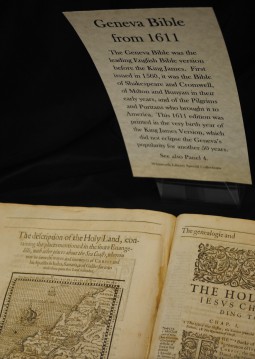
One of the issues facing Christianity today is that people are looking at this faith, and perhaps more particularly the Bible as though it were an “either/or” proposition. Either we interpret the Bible as though it were a history and science text or we reject it as a series of fairy tales with no application to our current life. The cause of this rift is more to be found within religion than science. It was not first scientific people who declared that Darwin’s findings refuted the Bible, it was religious people who declared that evolution can’t possibly be true because it was refuted in advance by the book of Genesis. Nor did this conflict begin with Darwin. Galileo spent the last years of his life under house arrest for daring to suggest that the telescope had helped prove the Copernican model of the solar system was correct; the earth is not the center of the solar system, the sun is, and there are lots of things out there that are not orbiting around our planet. Today we see that the shoe is on the other foot; there are plenty of folks who now believe the Bible has been refuted by science, and therefore religion in general, and the Judeo-Christian tradition in particular, is no longer relevant.
This conclusion is as sad as it is factually incorrect. What science has refuted is not the Bible itself, but a particular way of interpreting the Bible. The Bible is not science, it is not history, but under the influence of a positivistic perspective which suggests that something is true only if it can be historically verified or experimentally repeated, more and more people began to read the Bible as though it were a divinely inspired science and history book. That interpretation of the Bible has come under an increasingly successful attack.
We see the results today. It isn’t that more and more people are abandoning a scientific worldview in order to embrace Scripture, it is that more and more people are abandoning religion because they don’t think they have any choice. They are persuaded that evolution happened — and is still happening — they are persuaded that the universe is governed by certain “laws” that, though often mysterious, don’t get suspended periodically for the benefit of a few people. They do believe the “big bang” occurred, and so forth. Because these folks have been taught that they must choose between an inerrant Bible and science, they are choosing science; they see no real alternative.
That is a tragedy, because the choice is false. We don’t have to decide that we must either accept an inerrant Bible or the findings of science; there is a middle way between the two. It is the way that says the Bible as literature is the product of a world that understood life in mythological terms; it is the product of a particular place, time and culture. The Bible as God’s Word transcends that place, time and culture and speaks to us about the nature of humanity, our origin and destiny, the love of God and a host of other topics that are as important now as they ever were. But because it is a text from another time and culture it needs to be translated into our time and culture by folks who understand both. It is a middle way, in other words, between insisting upon an inerrant Bible, thus rejecting science, and a naïve scientism that would reduce all important truth to what is empirically verifiable, thus rejecting Scripture. The sooner those of us who believe in that middle way find our voice, the sooner we will discover just how many people there are who want to walk it with us.






